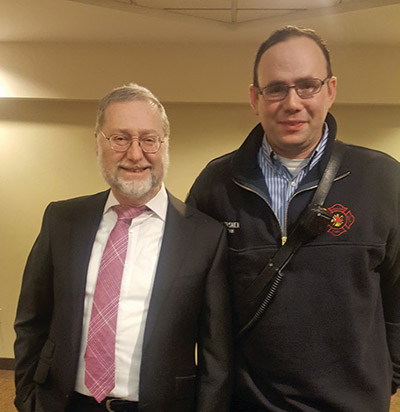
Mesorah NJ held a special Mesorah Monday program on February 12 at Congregation Ahavas Achim in Highland Park. The community was invited to hear Rabbi Mordechai Becher speak on the topic: “Blood Libels: From Greece to New York State.”
More than 50 people came to hear the presentation, which opened with a discussion about the wine used for the Passover seder. Red wine was easier to make in the time of the Bible, and the white wines of that era were very strong, so originally it was customary to use red wine for the seder. As far back as the sixth century CE, however, Rav Moshe Isserles wrote that in places where there were blood libels it was the custom to use white wine for the four cups.
The first known medieval blood libel was in 1144, when the murder of a young boy from the town of Norwich, England, was blamed on the local Jewish community despite a lack of evidence. An apostate spread the word that Jews needed the blood for a religious ritual. Many Jews were brought to authorities for interrogation and were tortured until they confessed. Later, the Jews of Blois, France, were accused of killing a Christian in 1171. All the Jews of the town were given the choice of conversion or death. They refused to be baptized and were burned to death. A similar story in Austria in 1181 involved three boys who disappeared after being last seen walking on a frozen river. Once again, the Jews were accused. The boys’ bodies were found after the river thawed and it was clear that they had drowned, but the accusations against the Jews continued.
Throughout the middle ages the anti-Jewish sentiment led to many other accusations and fabricated murder charges against the Jews, even as the bodies of missing people were found showing the people had been killed by wild animals or local gangs of criminals. The communities preferred to place the blame on the Jews, with many of the alleged victims canonized and declared saints by the church. So commonplace were the accusations that one of Chaucer’s Canterbury tales relates a story of a boy killed by Jews, even though Jews had been banished from England about 100 years earlier.
Rabbi Becher showed images of medieval art that depicted the events in woodcuts and stained glass as prominent works in churches and museums across Europe. Hitler was able to use these stories as a foundation for his actions against the Jews.
The libelous stories were not limited to Europe. In 1840, 13 notable members of the Damascus Jewish community were accused of murdering a priest. In Russia in 1911, Mendel Beilis was accused of murdering a Christian for ritualistic purposes. The lack of evidence and unreliable witnesses led to his not guilty verdict. Beilis then moved to the United States, where a play was written for the Yiddish theater to commemorate the events.
After a 4-year old girl went missing in Massena, New York, in 1928 a few days before Yom Kippur, officials questioned an assimilated Jew about the disappearance. The man’s lack of knowledge about Judaism left the police with the impression that there might be truth to the rumors of a Jewish ritualistic killing. The little girl was later found and told authorities that she had gotten lost and slept in the woods overnight until she could find her way. Some citizens did not believe this and felt her return was only due to the discovery of an alleged Jewish plot.
The presentation concluded with a note that this sort of anti-Semitism continues today in movies and other popular culture. A picture from 2004 was shown of a signboard outside Lovingway Church in Texas that read “Jews killed Christ.” Multiple commissions from the Vatican to investigate these allegations have determined there is no truth to the stories, yet they refuse to die. A professor at King Faisal University (Saudi Arabia) even wrote a newspaper article that claimed Jews use Christian blood in hamantaschen.
Rabbi Becher cautioned that we should think twice about hatred and baseless accusations. The second Temple in Jerusalem was destroyed because of baseless hatred; hopefully, baseless love will cause the temple to be rebuilt.
By Deborah Melman
Mesorah NJ connects young professionals and graduates by building a vibrant network of communities centered on Jewish values as part of the larger Mesorah USA network, which was founded in 2004. They meet on Monday evenings in Highland Park and have other events, such as Shabbat dinners and holiday events, throughout the state. For more information, visit www.MesorahNJ.com.










